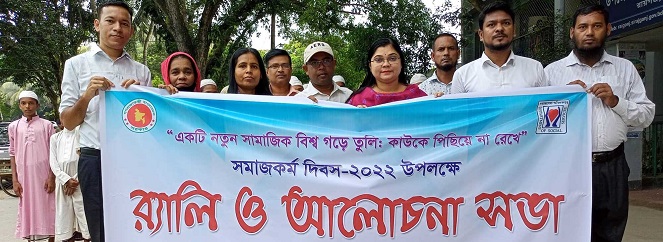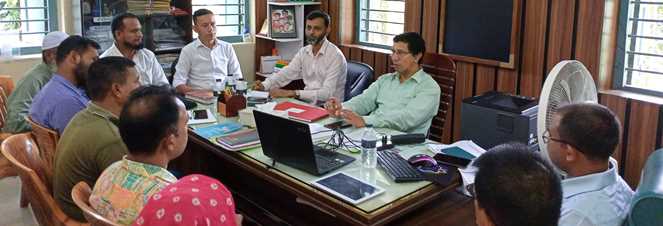-
- About Us
-
Our services
Inspection
-
Higher Offices
Division / District
Ministry / Department
- E-Service
- Gallery
- Contact
- Opinion & Suggestion
-
- About Us
-
Our services
Inspection
-
Higher Offices
Division / District
Ministry / Department
- E-Service
-
Gallery
Photo Gallery
Video Gallery
-
Contact
Office Contact
Communication Map
-
Opinion & Suggestion
opinion and feedback
The Department of Social Services is one of the other nation-building institutions of the government. Social welfare activities started in the country in 1955, but the Department of Social Services was created in 1961. The department created in the 60s has been upgraded to the Department of Social Services today. The activities of this department were initially city-based and service oriented. In the context of time, the activities of this department have expanded to the grassroots level across the country. The Department of Social Services under the Ministry of Social Welfare is working tirelessly to strengthen the social safety net with comprehensive and versatile programs in the welfare and development of the poor, neglected, backward, poor, orphans, autistic and disabled people and the backward people of the society.
After the partition of the country in 1947, various social problems including slum problems arose in the then provincial capital Dhaka. To solve these problems, under the advice of United Nations experts, Urban Community Development Board, Dhaka, in 1955, the city social service office and the hospital social service program were taken under the social welfare council. The Department of Social Welfare was created in 1961 by taking over the responsibility of running Vaghurre Kendra (Government Shelter), Rashtriya Atimkhana (Government Children's Home) under the Bengal Vagrants Act of 1943, Orphan and Widow Homes Act of 1944. Later, due to the extensive expansion and expansion of social service activities, it was promoted as a permanent nation-building department of the government in 1978 and recognized as the Department of Social Services in 1984.
In newly independent Bangladesh in 1972, the architect of Bangladesh, the greatest Bengali of all time, the undisputed leader of Bengal, Bangabandhu Sheikh Mujibur Rahman, the father of the nation, once again took on the role of a pioneer with the firm conviction to build a golden Bengal as the foundation of the vast masses of people, including war casualties and crippled people, in the existing terrible conditions.
Commitment to eradicating poverty and building a country free from exploitation:
In 1972 Bangabandhu Sheikh Mujibur Rahman promulgated the Bangladesh Abandoned Children Ordinance, 1972 for the purpose of rehabilitating war children in order to alleviate poverty and build a country free from exploitation; Signing agreement to set up 'SOS Shishu Palli' in Bangladesh, undertaking inter-state adoption scheme for orphaned children, setting up Women's Rehabilitation Board at the then Social Welfare Training Center located at Iskaton Garden Road in Birangana women's rehabilitation, 56 Care and Protection Centers with 100 seats each for orphaned children and distressed women ( CPC) which is currently being run as 'Sakari Shishu Parivar'. As a sign of foresight, he inserted Article 15(d) in the Constitution of the People's Republic of Bangladesh to make the provision of social security for the disabled, unfortunate and helpless people a constitutional responsibility of the state.
In 1973, the first five-year plan was formulated with special emphasis on social welfare activities, research and evaluation wing was established in the social welfare department, socio-economic training centers were established at Mirpur in Dhaka and Shalban in Rangpur for the rehabilitation of underprivileged women through cottage industry. Enactment of Children Act in 1974, introduction of integrated blind education program in 47 schools, introduction of rural family and child welfare programs, rural-centred social welfare programmes, adoption of socio-economic programs in beggar rehabilitation, initiatives to implement recommendations for establishment of separate juvenile courts to ensure child rights and transformation of Social Welfare Department into Social Welfare Department is done Father of the Nation Bangabandhu Sheikh Mujibur Rahman inaugurated the Rural Social Service (RSS) program as the pioneer of the first interest-free microcredit in independent Bangladesh.
In 1975, the Bangladesh Abandoned Children (Special Provisions) Rules, 1975, were enacted. Father of the Nation Bangabandhu Sheikh Mujibur Rahman established women-friendly rural maternal centers (RMC) for population control. From his return to independent Bangladesh to his martyrdom, 53 development projects were adopted in his short life to implement social welfare activities on a priority basis.
Continued march of development and prosperity begins:
In Kal Parikrama in 1996, the honorable Prime Minister of the People's Republic of Bangladesh, Sheikh Hasina, by the constitutional obligation left by the father of the nation and strong personal leadership, started the development and prosperity through the implementation of sustainable safety net and social security footwear program for the poor, neglected, backward, underprivileged backward communities. Continued progress. Along with the above mentioned 'Rural Social Service' and 'Rural Mother Centres', a total of 4 poverty alleviation programs including 'Urban Social Service Program' and 'Rehabilitation Program for Burnt and Disabled Persons' are ongoing. With the approval of Bangladesh Technical Education Board, 80 urban social service offices have been converted into 'Skill Development Training Centers' with the approval of Bangladesh Technical Education Board to raise the training programs of 80 urban social service offices to meet the fourth industrial revolution in building Smart Bangladesh.
Humans are social creatures. Childhood comes first in the human life cycle. Therefore, the significant activities carried out by the Department of Social Services in order of life cycle are institutional, social security, activities and planning.
Institutional Activities:
The Department of Social Services is conducting various 212 institutional activities aimed at development, protection and development of children. Abandoned in 6 Chotmani residences
Planning and Implementation: Cabinet Division, A2I, BCC, DoICT and BASIS








